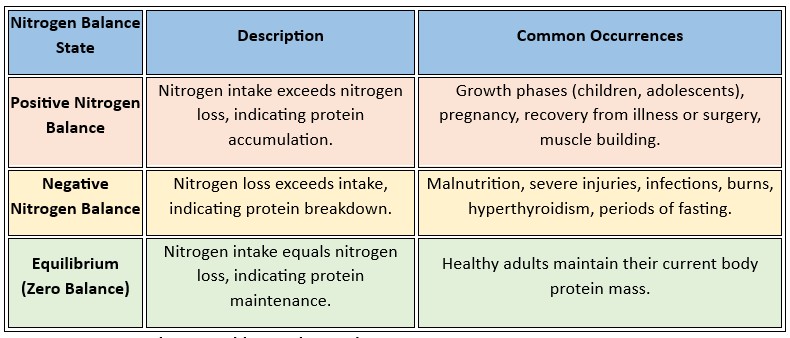Nitrogen Balance
What is Nitrogen Balance?
Nitrogen balance represents the difference between nitrogen consumed (primarily through dietary proteins) and nitrogen excreted (via urine, feces, sweat, hair, and skin). It serves as an index of protein metabolism, indicating whether the body is gaining, losing, or maintaining protein.
Understanding nitrogen balance is crucial in medical biochemistry and nutrition, as it reflects the body's protein metabolism and overall health. Nitrogen, a key component of amino acids—the building blocks of proteins—is obtained from dietary sources and is vital for numerous bodily functions, including tissue repair, enzyme and hormone synthesis, and immune responses. The equilibrium between nitrogen intake and excretion is referred to as nitrogen balance.
The states of nitrogen balance are categorized as follows:
Negative Nitrogen Balance: Catabolism and Protein Breakdown
A negative nitrogen balance indicates a catabolic state, where the body breaks down its proteins to meet metabolic demands. This can occur due to:
Malnutrition or Starvation: Insufficient dietary protein leads the body to utilize muscle proteins for essential functions.
Illness and Trauma: Conditions like infections, burns, and severe injuries increase protein breakdown as the body responds to stress.
Aging: Muscle mass declines with age, and without adequate protein intake, this can lead to sarcopenia—a loss of muscle strength and function.
In a state of negative nitrogen balance, the body may experience muscle wasting, weakened immunity, and delayed recovery from illness or injury. Clinicians may monitor nitrogen balance closely in critically ill or malnourished patients, ensuring that they receive adequate protein to prevent further muscle degradation and support healing.
Positive Nitrogen Balance: Building and Growth
A positive nitrogen balance suggests an anabolic state where the body is building more tissue than it is breaking down. This state is essential during:
Growth Phases: Children and adolescents require additional protein for development.
Pregnancy: Expectant mothers need more protein to support fetal growth.
Recovery from Illness or Surgery: The body repairs tissues and regenerates cells, necessitating increased protein intake.
Strength Training: Athletes and individuals engaging in resistance training need extra protein for muscle repair and growth.
In these situations, a positive nitrogen balance indicates that the body has sufficient protein for the repair and building of new tissues. Clinicians and nutritionists may recommend higher protein intake during these times to support the body's anabolic needs, ensuring adequate amino acids are available to build new proteins and enhance recovery.


Nitrogen Balance=Nitrogen Intake−Nitrogen Loss
Nitrogen intake primarily comes from dietary proteins, while nitrogen loss occurs mainly through urine (as urea), feces, sweat, and minor losses such as hair and skin growth
Nitrogen Equilibrium:
This is a state where nitrogen intake equals nitrogen loss, maintaining a stable level of body protein. It is typical in healthy adults.
Measuring Nitrogen Balance: Clinical Applications
Assessing nitrogen balance involves measuring nitrogen intake and loss, providing insights into a person's protein metabolism and nutritional status. This is particularly useful in clinical settings to tailor nutritional interventions.
Urinary Urea Nitrogen (UUN): By collecting a 24-hour urine sample, clinicians can estimate nitrogen excretion and determine nitrogen balance. citeturn0search9
Total Body Nitrogen Measurement: Advanced techniques like dual-energy X-ray absorptiometry (DEXA) offer comprehensive assessments of body nitrogen stores, aiding in the management of chronic illnesses or surgical recovery.
Why is Nitrogen Balance Important?
Understanding and monitoring nitrogen balance has practical implications:
Assessing Protein Requirements: Determines the necessary dietary protein to support health, especially in recovery or illness.
Preventing Muscle Loss in the Elderly: Maintaining nitrogen balance helps preserve muscle mass, reducing the risk of falls and improving quality of life.
Guiding Nutritional Support in Critical Care: Ensures patients receive adequate protein to support healing and prevent muscle wasting.
Supporting Athletic Performance: Athletes monitor nitrogen balance to optimize muscle growth and recovery through proper nutrition.
Conclusion: A Balanced Approach to Health
Nitrogen balance is a fundamental aspect of health, reflecting the body's protein needs for growth, repair, and maintenance. For medical and dental students, comprehending nitrogen balance provides insights into protein metabolism's role in health and disease. Whether managing patient recovery, addressing malnutrition, or enhancing athletic performance, maintaining appropriate nitrogen balance is essential for overall well-being.
BLOG
Join us to explore medical biochemistry intricacies.
WRITE TO US
© 2024. All rights reserved.
